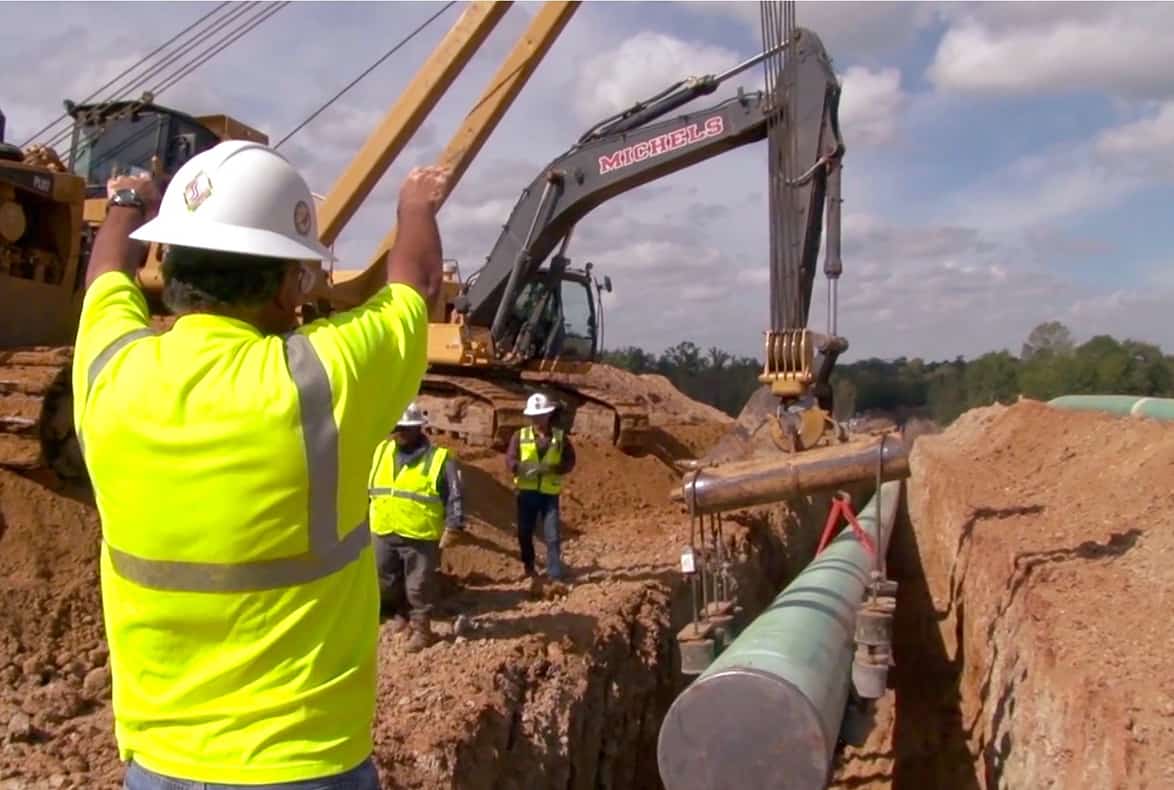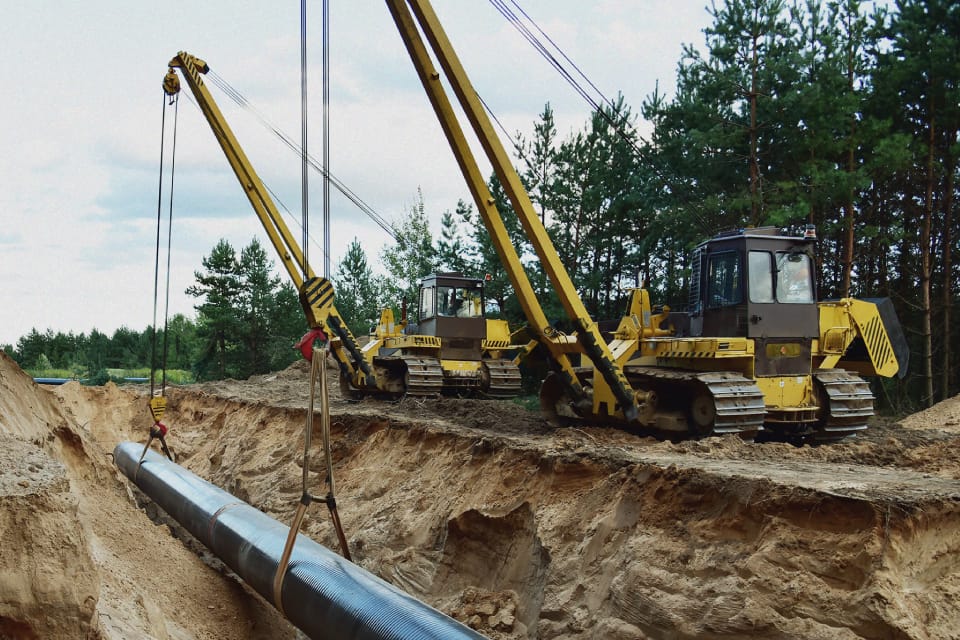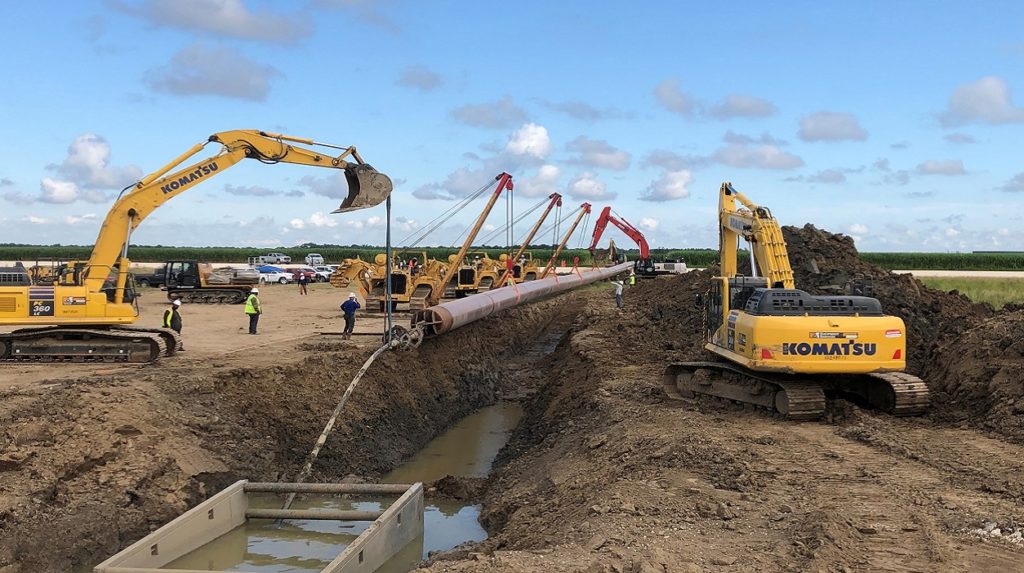What Makes Pipeline Construction Excellence Reliable in Energy Infrastructure
Why Pipeline Construction Is Crucial for Energy Facilities Growth
Pipeline construction plays a vital function in the development of energy framework, serving as the foundation for the transportation of necessary resources like oil and all-natural gas. This complex network not just facilitates effective distribution but also bolsters financial development with task creation and local investment. In addition, innovations in safety and security innovations are dealing with ecological concerns, positioning pipelines as a keystone of sustainable power strategies. The complexities bordering pipeline jobs increase essential inquiries about regulative frameworks and their lasting impact on neighborhoods and environments. Discovering these dimensions reveals a multifaceted story that necessitates careful consideration.
Duty of Pipelines in Power Supply
The crucial function of pipelines in energy supply can not be overemphasized, as they work as the backbone of contemporary energy facilities. Pipelines are crucial for the reliable transport of various types of energy, consisting of oil, gas, and refined items. They help with the activity of these sources from extraction sites to refineries and distribution facilities, guaranteeing that energy reaches customers in a timely manner.The construction of pipelines entails thorough planning and adherence to regulative criteria, mirroring the intricacies of the power market and ecological considerations. Reliable pipeline networks are created to lessen transportation times, reduce costs, and boost safety and security, while additionally resolving prospective environmental impacts. The capability to deliver huge volumes of power over cross countries makes pipelines a favored choice for energy companies seeking to maximize their supply chains.Moreover, pipelines add to energy safety and security by expanding supply paths and sources. As worldwide power needs rise and fall, pipelines make it possible for areas to accessibility numerous power materials, mitigating risks linked with dependence on solitary sources. This diversification cultivates competitive rates and maintains markets, which is important in a progressively interconnected international economy.In enhancement to their logistical advantages, pipelines sustain local economies by developing jobs throughout construction and upkeep stages. The presence of a durable pipe framework additionally brings in investments in energy tasks, further boosting local growth. Ultimately, pipelines are essential to the power industry, giving a trustworthy and reliable means of transport that underpins economic development and sustainability.

Benefits of Effective Transport
Reliable transportation with pipeline systems provides substantial benefits, consisting of lowered transportation prices and boosted distribution speed. These advantages not only boost the overall business economics of energy circulation yet additionally play a vital function in decreasing the ecological impact associated with energy transportation. As power needs remain to climb, the importance of optimizing transportation methods comes to be increasingly obvious.

Decreased Transport Prices
Decreased transport costs represent a notable benefit in the domain of power framework development. The construction of pipelines supplies a more financially sensible means of delivering energy sources compared to alternative approaches such as trucking or rail transportation. Pipelines, as soon as established, enable the continuous flow of oil, gas, and other products over fars away with marginal functional costs.One of the key factors for reduced transportation expenses is the effectiveness of pipeline systems. They can deliver large volumes of products all at once, therefore spreading taken care of expenses over a better amount of product. This bulk transport ability notably reduces the expense each, making energy resources more inexpensive for consumers and services alike.Additionally, pipelines decrease the dangers and prices connected with handling and keeping unstable products. Unlike rail or roadway transport, which can sustain hold-ups and damages, pipelines offer a much safer and extra regular technique of power conveyance. As a result, this reliability boosts the economic expediency of energy jobs, permitting much better pricing frameworks in affordable markets. Inevitably, minimized transport prices promote a more lasting power sector, advertising larger accessibility and motivating financial investment in additional development.
Enhanced Distribution Rate
Pipelines significantly enhance delivery speed in power transport, using an important benefit over conventional techniques such as trucking or rail systems. The continuous flow of materials through pipelines enables a steady and reliable transport procedure, minimizing hold-ups connected with loading and discharging. This continuous activity is particularly vital for power sources, where demand can rise and fall rapidly.Moreover, pipelines can run around the clock, untouched by traffic conditions or weather-related disruptions that can impede road or rail transportation. This dependability ensures that power items get to customers swiftly, sustaining operational needs and reinforcing economic stability. In addition, the scalability of pipe systems promotes the handling of big volumes of energy, which is important for satisfying the expanding needs of sectors and domestic sectors.Furthermore, the assimilation of innovative monitoring and control technologies in pipeline systems improves the distribution process. These advancements permit real-time monitoring of flow prices and system pressures, guaranteeing that any potential concerns are dealt with quickly. Overall, the boosted shipment speed offered by pipelines is a substantial aspect in optimizing power facilities and guaranteeing that supply chains continue to be durable and responsive to market needs.
Environmental Effect Factors To Consider
The benefits of quick power transport prolong beyond logistical advantages; they also incorporate considerable ecological factors to consider. Reliable pipeline systems enable the transport of power resources with minimal disruption to communities compared to alternate techniques such as vehicle or rail transport. Pipelines can facilitate the motion of oil, gas, and other products in a highly focused manner, which decreases the carbon footprint connected with power distribution.Moreover, pipelines are created with sophisticated safety and security and monitoring innovations that considerably lower the danger of spills and leaks. An effective pipeline facilities lessens the need for frequent transportation activities, which can result in lowered greenhouse gas emissions gradually (Professional Oilfield Services Texas). The ability to transport power sources directly to customers reduces dependence on more polluting transport approaches, better benefiting air quality.In addition, calculated pipe placement can aid protect sensitive habitats by adhering to existing corridors, therefore minimizing the effect on wildlife and all-natural landscapes. Generally, the construction of pipelines not just supports energy facilities advancement yet additionally offers an eco liable methods of transferring power, adding to a more sustainable future
Economic Impact of Pipeline Projects
The economic influence of pipeline jobs expands past mere transportation effectiveness, substantially affecting regional and local economic situations. These campaigns create task possibilities throughout both construction and ongoing operations, promoting community development (Pipeline Construction Authority). In addition, the stimulation of economic development through increased investment and framework improvement is a vital advantage of pipe construction
Job Production Opportunities
While learn this here now power facilities tasks typically face scrutiny, they provide considerable work development opportunities that can positively influence regional economic situations. Pipeline construction jobs need a diverse variety of proficient labor, consisting of engineers, project managers, and specialized technicians, along with inexperienced laborers for different roles. This diverse need for labor can cause the creation of hundreds of tasks throughout the construction phase and typically results in lasting job opportunity once the infrastructure is operational.In addition to route work, pipe projects stimulate local economies by creating supplementary task possibilities in industries such as transport, production, and friendliness. Neighborhood services benefit from increased demand for goods and solutions, adding to overall economic health. Additionally, the influx of workers can lead to boosted tax obligation incomes for neighborhood federal governments, which can be reinvested in social work and infrastructure.Moreover, pipeline construction jobs typically focus on hiring local employees, promoting a sense of area investment and assistance. By linking the void in between power supply and demand, these projects not just improve energy safety but likewise act as catalysts for financial advancement, enhancing the importance of pipeline construction in job creation initiatives.
Financial Growth Stimulation
Pipeline tasks offer as a powerful financial growth stimulation, driving significant financial investments right into regional and local economic situations. The construction and operation of pipelines produce a ripple effect, producing demand for materials, tools, and services (Permian Basin Pipeline Solutions). This increase of capital sustains regional companies, from producing to friendliness, fostering a robust financial environment.Moreover, these projects create significant tax obligation incomes for districts and states, which can be reinvested in public services, infrastructure enhancements, and area development initiatives. The economic benefits expand past immediate job development, as skilled labor is often needed for ongoing maintenance and procedures, making sure long-lasting employment opportunities.Additionally, the improved power facilities promotes the reliable transport of resources, potentially decreasing power expenses for customers and services alike. By improving power access, pipelines can attract brand-new sectors and promote development in existing markets, adding to total financial diversification
Ecological Considerations and Innovations
Balancing energy needs with environmental stability comes to be progressively essential as pipe construction increases. The quest of effective energy transport have to represent environmental effects, requiring ingenious techniques and modern technologies that minimize eco-friendly interruption. Modern pipeline projects are progressively integrating advanced environmental evaluations at every stage, ensuring that potential risks are identified and reduced early in the planning process.One significant innovation in this field is the adoption of trenchless innovation, which permits the installment of pipelines without substantial surface disruption. This approach minimizes environment fragmentation, maintains existing environments, and minimizes the carbon impact related to standard excavation methods. Additionally, real-time monitoring systems equipped with sensors allow operators to identify leaks or ecological adjustments promptly, thereby assisting in timely reactions to possible hazards.Moreover, the incorporation of ecologically friendly materials and construction techniques is acquiring grip. Biodegradable drilling fluids and corrosion-resistant coatings can substantially reduce the ecological footprint of pipeline jobs. Business are additionally dedicating to bring back environments post-construction, making use of native plant types to aid in ecosystem recovery.Collaboration with environmental companies and regional areas is essential - Pipeline Construction Excellence. Involving stakeholders in the decision-making procedure fosters openness and advertises sustainable methods, guaranteeing that energy framework development straightens with ecological stewardship
Obstacles in Pipeline Construction
In the middle of the expanding demand for energy framework, different obstacles complicate the construction of pipelines. One of the primary issues is the geographical variability of pipeline routes, which can go across varied landscapes, including mountains, rivers, and urban areas. Each setting requires customized engineering services to resolve environmental security, geological security, and logistical constraints.Additionally, the general public perception of pipe projects often presents a significant obstacle. Regional communities may express concerns concerning possible ecological impacts, security dangers, and disturbance during construction. This opposition can result in hold-ups, boosted prices, and the requirement for considerable community engagement techniques to foster acceptance.Moreover, labor shortages in skilled trades better complicate pipe construction initiatives. As the demand for energy facilities grows, the accessibility of skilled personnel decreases, which can cause task hold-ups and raised labor prices. The pipe sector should purchase labor force advancement efforts to grow an experienced labor pool with the ability of satisfying the advancing demands.Safety stays an extremely important problem throughout the construction process. The sector deals with the challenge of guaranteeing that all security procedures are abided by, as also small gaps can lead to significant crashes. This demands strenuous training and oversight to preserve functional integrity.Lastly, fluctuating product prices can impact project spending plans and timelines. The demand for high-quality materials, coupled with market volatility, requires cautious economic preparation and danger reduction techniques to maintain projects on course. Addressing these difficulties is necessary for the effective and efficient construction of pipelines as part of a durable energy infrastructure.
Regulatory Framework and Conformity
The governing framework controling pipe construction is complex and diverse, needing conformity with a selection of federal, state, and local regulations. At the federal degree, agencies such as the Federal Energy Regulatory Commission (FERC) and the Pipeline more and Hazardous Materials Safety Management (PHMSA) play important functions in overseeing pipeline tasks. FERC regulates the transportation of all-natural gas and oil, accepting projects based on economic demand and public interest, while PHMSA concentrates on safety and security criteria and the honesty of pipe operations.State guidelines can differ significantly, with private states enforcing their own allowing procedures, safety and security guidelines, and environmental evaluations. As an example, state utility compensations may call for additional scrutiny of suggested courses to guarantee very little disturbance to areas and communities. Compliance with the National Environmental Policy Act (NEPA) is also essential, mandating thorough environmental influence analyses prior to task approval.Local laws may better make complex the compliance landscape, as communities commonly have specific zoning legislations, land use laws, and community involvement needs. Engaging with neighborhood stakeholders is not only a regulatory need yet likewise an ideal technique to help with smoother project execution.Moreover, the regulative landscape is constantly advancing, influenced by public belief, technical improvements, and ecological policies, requiring continuous watchfulness from pipeline operators. Steering through this complex governing structure is crucial for validating that pipeline construction projects are not only legitimately compliant yet likewise socially accountable and environmentally sustainable, consequently adding to the overall performance of power framework growth.
Future Patterns in Pipeline Infrastructure
A substantial transformation is underway in pipe framework, straight from the source driven by improvements in modern technology, evolving energy needs, and boosting ecological consciousness. As the international energy landscape changes in the direction of eco-friendly sources, pipe systems are adapting to suit diverse energy kinds, including natural gas and biofuels, while likewise integrating more advanced tracking and safety and security technologies.One noteworthy fad is the unification of digital options, such as Internet of Points (IoT) tools and synthetic knowledge (AI), which improve real-time monitoring and predictive upkeep capacities. These innovations not just boost operational performance yet also substantially minimize the risk of leaks and mishaps, making sure better environmental management. In addition, making use of advanced products, such as composite pipes, is gaining traction because of their durability and resistance to deterioration, further extending the life-span of pipeline systems.Moreover, the emphasis on sustainability is triggering the advancement of greener construction methods. Methods such as trenchless innovation minimize land disruption and ecological effect, lining up pipe jobs with modern-day ecological standards. Additionally, regulative frameworks are evolving to advertise transparency and accountability in pipe operations, making sure stakeholders are a lot more informed concerning possible dangers and advantages.
Regularly Asked Questions
Just How Do Pipelines Compare to Other Transportation Techniques for Energy Resources?
Pipelines supply a cost-efficient, efficient, and eco-friendly method for moving power sources contrasted to options like vehicles and trains, which usually sustain higher functional expenses, better land use, and increased greenhouse gas emissions. - Pipeline Construction Excellence

What Materials Are Generally Utilized in Pipeline Construction?
Typical products used in pipeline construction include carbon steel, stainless steel, and plastic composites. These materials are chosen for their toughness, toughness, deterioration resistance, and viability for different ecological conditions and sorts of transferred power sources.

The length of time Does It Generally Take to Build a Pipe?
The duration for pipe construction differs significantly based on elements such as length, surface, and regulatory requirements. Commonly, it can vary from a number of months to a couple of years, relying on project intricacy and ecological considerations.
That Are the Key Stakeholders in Pipeline Projects?
Trick stakeholders in pipeline jobs include federal government firms, governing bodies, energy firms, environmental companies, neighborhood communities, and landowners - Midland Pipeline Construction Authority. Each group plays a crucial role in planning, allowing, construction, and recurring operations of pipeline infrastructure
What Are the Primary Safety And Security Actions Throughout Pipeline Construction?
During pipeline construction, primary safety measures consist of extensive website assessments, adherence to regulative requirements, detailed training for workers, the use of individual safety devices, and constant tracking of environmental problems to mitigate dangers and ensure operational security.